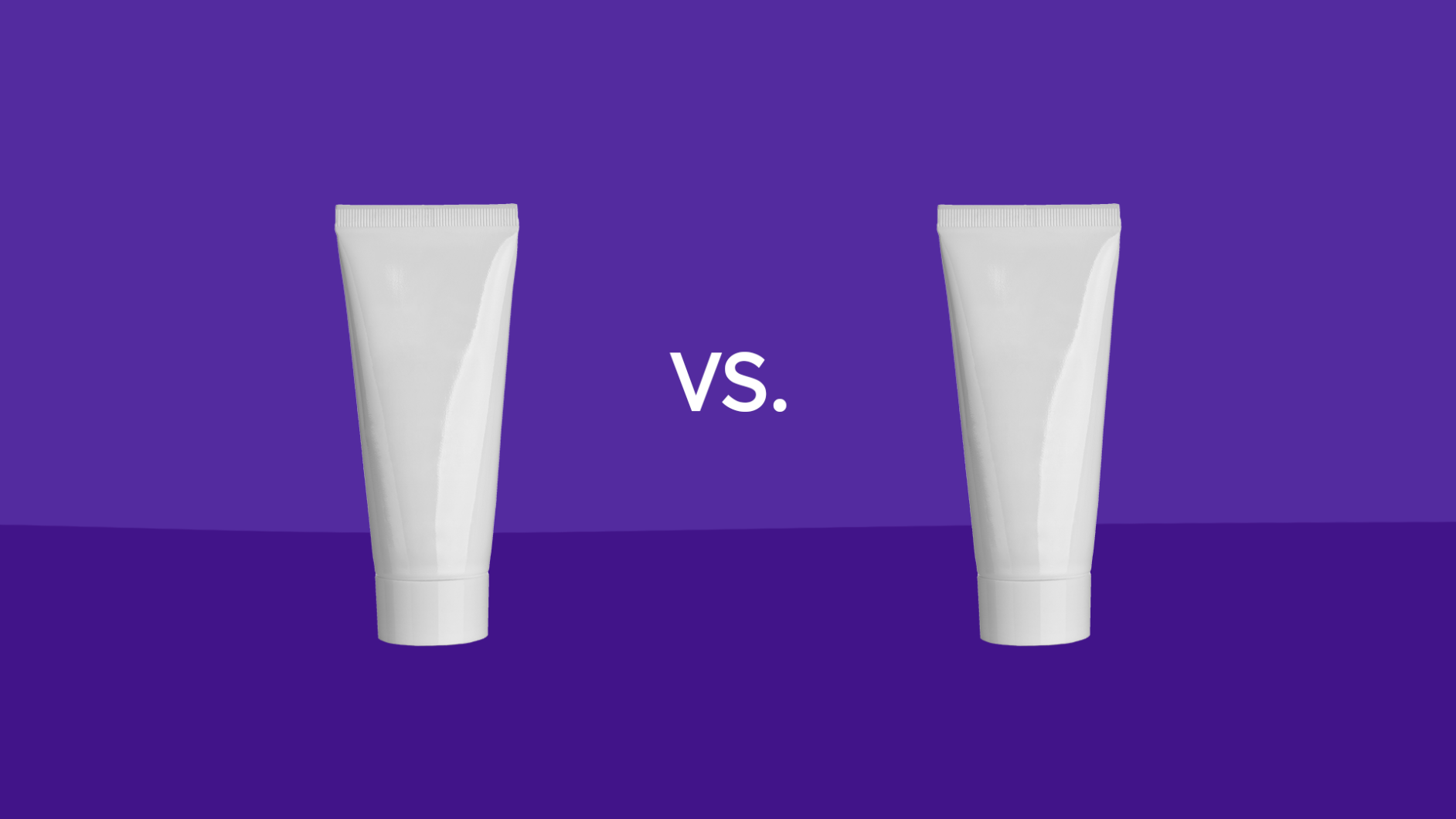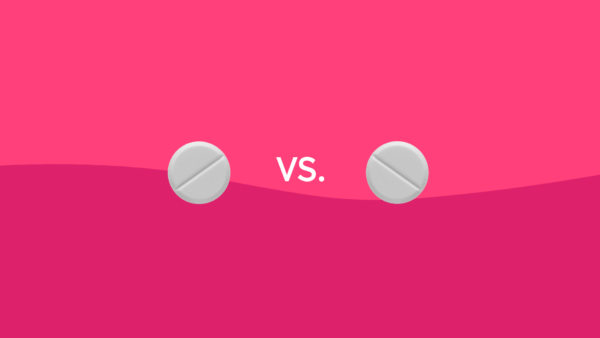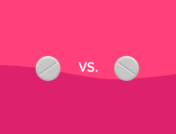Drug overview & main differences | Conditions treated | Efficacy | Insurance coverage and cost comparison | Side effects | Drug interactions | Warnings | FAQ
When it comes to steroids, hydrocortisone and cortisone are two options your doctor may recommend. Hydrocortisone and cortisone are mild corticosteroids that are mainly used to treat skin conditions, rheumatic diseases, and adrenal disorders.
Hydrocortisone and cortisone are man-made corticosteroid agents that mimic the effects of steroid hormones naturally produced in the body. The steroid hormones produced by the adrenal gland are mineralocorticoid (aldosterone), which plays a role in fluid retention, and glucocorticoid (cortisol), which has anti-inflammatory effects.
Despite their similarities in how they work, hydrocortisone and cortisone have differences in potency, formulation, and usage.
What are the main differences between hydrocortisone vs. cortisone?
Hydrocortisone (What is Hydrocortisone?) is a generic corticosteroid that is available over-the-counter (OTC) or with a prescription. Brand names of hydrocortisone include Cortef, Cortizone, Anucort-HC, and Preparation H. Hydrocortisone is available as an oral tablet, topical cream, topical lotion, and topical ointment. It also comes as a rectal suppository.
Cortisone (What is Cortisone?) is a generic corticosteroid that is only available with a prescription. Cortisone is taken as an oral tablet and is sometimes known by its brand name, Cortone. Compared to hydrocortisone, cortisone is less potent. This is because cortisone by itself is inactive. After it’s administered, cortisone converts into hydrocortisone, or cortisol, in the liver.
| Main differences between hydrocortisone vs. cortisone | ||
|---|---|---|
| Hydrocortisone | Cortisone | |
| Drug class | Corticosteroid | Corticosteroid |
| Brand/generic status | Brand and generic available | Generic available (brand name discontinued) |
| What is the brand name? | Cortef, Hydrocort, Cortizone, Ala-Cort, Anucort-HC, Preparation H | Cortone |
| What form(s) does the drug come in? | Oral tablet Topical cream Topical lotion Topical ointment Rectal suppository Rectal cream |
Oral tablet |
| What is the standard dosage? | Oral dosage: 20 to 240 mg per day, depending on the condition being treated and the person’s response to the medication Topical: Apply to the affected area 2 to 4 times per day |
Oral dosage: 35 to 300 mg per day, depending on the condition being treated and the person’s response to the medication |
| How long is the typical treatment? | Duration depends on the condition being treated, but OTC topical use is no more than 7 days | Duration depends on the condition being treated |
| Who typically uses the medication? | Adults and children over 2 years old | Adults |
Conditions treated by hydrocortisone vs. cortisone
Both hydrocortisone and cortisone can be used to treat inflammation from a variety of conditions. These corticosteroids can help treat inflammation from allergic conditions, respiratory conditions, gastrointestinal diseases, adrenal gland disorders, and rheumatic conditions. Since steroids are often used to target inflammatory symptoms, they may be used along with other drugs that treat the source of the problem.
Topical hydrocortisone is FDA approved to treat contact dermatitis or skin inflammation from an allergic reaction. Hydrocortisone can also be used to treat skin irritations and itchy symptoms after coming in contact with poison ivy or poison oak. For those who experience bad reactions to insect bites, topical corticosteroids like hydrocortisone can help relieve itchiness and inflammation.
| Condition | Hydrocortisone | Cortisone |
| Dermatological disorders (contact dermatitis, atopic dermatitis) | Yes | Yes |
| Gastrointestinal conditions (ulcerative colitis, Crohn’s disease) | Yes | Yes |
| Rheumatic conditions (arthritis, lupus) | Yes | Yes |
| Adrenal gland disorders (adrenal insufficiency or Addison’s disease) | Yes | Yes |
| Oncologic diseases (Hodgkin lymphoma, chronic lymphocytic leukemia) | Yes | Yes |
| Respiratory conditions (pneumonia) | Yes | Yes |
| Other inflammatory conditions (allergic reactions, asthma exacerbations) | Yes | Yes |
Is hydrocortisone or cortisone more effective?
Hydrocortisone is slightly more potent than cortisone. When comparing doses, 1.25 milligrams of cortisone is equal to 1 milligram of hydrocortisone. Cortisone is inactive until it becomes hydrocortisone through processing in the liver. Since cortisone essentially is hydrocortisone, but with an extra step needed to make it active, it’s not prescribed as often.
Currently, there are no clinical trials that directly compare hydrocortisone and cortisone for a specific condition. Compared to other corticosteroids like prednisone and triamcinolone, hydrocortisone and cortisone are mild and short-acting. Compared to other topical corticosteroids, topical hydrocortisone is considered a low-potency corticosteroid.
It’s recommended to consult a healthcare provider for medical advice before purchasing OTC hydrocortisone. Otherwise, it’s necessary to visit a doctor in order to get a prescription for hydrocortisone or cortisone tablets.
Get the SingleCare prescription discount card
Coverage and cost comparison of hydrocortisone vs. cortisone
Generic versions of hydrocortisone are generally covered by Medicare and other insurance plans. Hydrocortisone can also be found over-the-counter so this may affect the coverage of some plans. A tube of hydrocortisone cream can run for as much as $30. If you have a doctor’s prescription and use a discount card, such as the SingleCare card, hydrocortisone can cost less than $5.
Cortisone tablets can only be purchased with a valid doctor’s prescription. Most Medicare and insurance plans will cover generic cortisone. The average retail cost of cortisone can be as high as $102. You can also use a SingleCare cortisone coupon to pay around $85 for a quantity of 30 tablets.
| Hydrocortisone | Cortisone | |
| Typically covered by insurance? | Yes | Yes |
| Typically covered by Medicare Part D? | Yes | Yes |
| Standard dosage | 20 to 240 mg per day divided into separate doses | 25 to 300 mg per day divided into separate doses |
| Typical Medicare copay | $1–$5 | $1–$90 |
| SingleCare cost | $5+ | $85+ |
Common side effects of hydrocortisone vs. cortisone
Hydrocortisone and cortisone, like other corticosteroids, can cause similar side effects. Common side effects of hydrocortisone and cortisone include headache, dizziness, increased sweating, and flushing of the skin. Other side effects may include impaired wound healing, muscle weakness, and high blood pressure. The use of corticosteroids can also lead to sodium and fluid retention, which can manifest as weight gain.
Serious side effects of corticosteroids include allergic reactions or anaphylaxis. The risk of side effects is associated with the dose and duration of treatment. For this reason, hydrocortisone and cortisone are not recommended for long-term use. When used for longer periods of time, corticosteroids can lead to an increased risk of osteoporosis, or bone loss, and irregularities in the adrenal gland.
| Hydrocortisone | Cortisone | |||
| Side effect | Applicable? | Frequency | Applicable? | Frequency |
| Headache | Yes | * | Yes | * |
| Dizziness | Yes | * | Yes | * |
| Increased sweating | Yes | * | Yes | * |
| Skin flushing | Yes | * | Yes | * |
| Impaired wound healing | Yes | * | Yes | * |
| Muscle weakness | Yes | * | Yes | * |
| High blood pressure | Yes | * | Yes | * |
| Sodium and fluid retention | Yes | * | Yes | * |
| Increased blood sugar | Yes | * | Yes | * |
*not reported
This may not be a complete list of adverse effects that can occur. Please refer to your doctor or healthcare provider to learn more.
Source: DailyMed (Hydrocortisone), DailyMed (Cortisone)
Drug interactions of hydrocortisone vs. cortisone
Hydrocortisone and cortisone are processed in the liver by the CYP3A4 enzyme. Drugs that block, or inhibit, this enzyme can increase hydrocortisone or cortisone levels and increase the risk of side effects. By the same token, drugs that stimulate, or induce, this enzyme can decrease hydrocortisone or cortisone levels and lower their overall effectiveness.
Hydrocortisone and cortisone can interact with CYP3A4 inhibitors such as erythromycin, clarithromycin, isoniazid, and ketoconazole. Hydrocortisone and cortisone can also interact with CYP3A4 inducers such as rifampin, carbamazepine, and phenobarbital.
Since corticosteroids can increase blood sugar levels, dosing may need to be adjusted while taking antidiabetic drugs. Corticosteroids can also affect the blood levels of aspirin and anticoagulants like warfarin.
Corticosteroids can suppress the immune system. Therefore, live vaccines should be avoided while taking corticosteroids because of an increased risk of infection.
| Drug | Drug Class | Hydrocortisone | Cortisone |
| Clarithromycin Erythromycin Isoniazid Rifampin |
Antibiotic | Yes | Yes |
| Itraconazole Ketoconazole |
Antifungal | Yes | Yes |
| Carbamazepine Phenobarbital Phenytoin |
Anticonvulsant | Yes | Yes |
| Aspirin | Antiplatelet/Salicylate | Yes | Yes |
| Warfarin | Anticoagulant | Yes | Yes |
| Metformin Glyburide Repaglinide Rosiglitazone |
Antidiabetic | Yes | Yes |
| Live influenza vaccine MMR vaccine |
Live vaccine | Yes | Yes |
Consult a healthcare professional for other possible drug interactions.
Warnings of hydrocortisone vs. cortisone
Staying on corticosteroids for long periods of time can affect how well the adrenal gland is able to produce steroid hormones on its own. This can lead to secondary adrenal insufficiency, which is common after abrupt discontinuation of therapy. Therefore, treatment with corticosteroids should be tapered slowly to avoid possible withdrawal.
Corticosteroids should be used with caution if you have liver damage (cirrhosis) or an underactive thyroid (hypothyroidism).
Corticosteroids can suppress growth and development in children. In most cases, hydrocortisone and cortisone should be avoided in children. In some cases, children may be put on corticosteroids in controlled doses.
Using corticosteroids can increase the risk of infections. Corticosteroids can act as immunosuppressants, which can lower your body’s ability to fight off infections.
Consult your healthcare provider for other precautions while taking hydrocortisone or cortisone.
Frequently asked questions about hydrocortisone vs. cortisone
What is hydrocortisone?
Hydrocortisone is a corticosteroid used to treat inflammation caused by different conditions such as arthritis, asthma, and ulcerative colitis. Hydrocortisone is available in oral and topical forms. Topical hydrocortisone is used to treat contact dermatitis and other inflammatory skin diseases. Brand names of hydrocortisone include Cortef and Hydrocort.
What is cortisone?
Cortisone is a corticosteroid prescribed to treat inflammatory symptoms that occur from a variety of conditions. It is also known by the brand name Cortone, which has been discontinued. Cortisone is available as a 25 mg oral tablet that is usually taken multiple times per day for several days depending on the condition being treated.
Are hydrocortisone and cortisone the same?
Hydrocortisone and cortisone are identical short-acting corticosteroids. However, they are not the same. Cortisone is an inactive prodrug that is converted into hydrocortisone, or cortisol, in the liver. Hydrocortisone works as a topical medication whereas cortisone is not as effective as a topical treatment.
Is hydrocortisone or cortisone better?
Hydrocortisone is more potent than cortisone (1 mg of hydrocortisone is equivalent to 1.25 mg of cortisone). Hydrocortisone is also available over-the-counter as a topical cream, lotion, or ointment for skin conditions. Your doctor may prescribe hydrocortisone or cortisone after a complete evaluation of your condition.
Can I use hydrocortisone or cortisone while pregnant?
Low-dose corticosteroids may sometimes be used during pregnancy. However, because of their risk of side effects, such as high blood pressure, increased blood sugar levels, and fluid retention, corticosteroids should only be used if the benefits outweigh the risks. Consult a healthcare provider on the safety of corticosteroids during pregnancy.
Can I use hydrocortisone vs. cortisone with alcohol?
Corticosteroids and alcohol are not generally recommended to be taken together. Drinking alcohol regularly can alter blood sugar levels and affect the immune system. The side effects of corticosteroids and alcohol can overlap and lead to harmful situations.
Is hydrocortisone a corticosteroid?
Hydrocortisone is a synthetic corticosteroid. Its effects mimic those of the naturally produced glucocorticoid, cortisol. Compared to other corticosteroids, hydrocortisone is considered a low-potency corticosteroid.
What does cortisone treat?
Cortisone is used as an anti-inflammatory and immunosuppressant drug. It can treat inflammation from skin diseases, lung conditions, autoimmune disorders, and infections. Cortisone can also be used to treat allergic reactions and severe asthma episodes.





